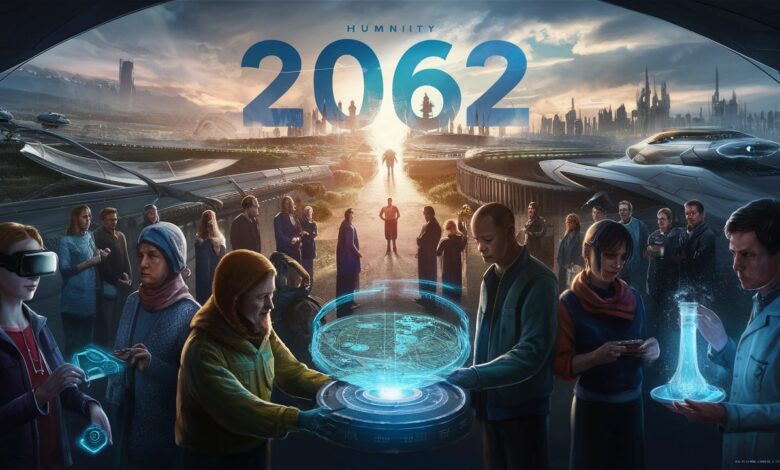2062: A Glimpse Into Humanity’s Pivotal Crossroads

The year 2062 looms on the horizon not merely as a date, but as a symbol of humanity’s most consequential epoch. By this juncture, cumulative breakthroughs in technology, climate policy, and societal evolution will have sculpted a world both exhilarating and fraught with existential stakes. We stand at the precipice of an era where artificial intelligence could eclipse human cognition, where rising sea levels might redraw continental maps, and where interplanetary colonization shifts from sci-fi fantasy to tangible reality. This article ventures beyond speculation—grounded in current trajectories—to explore the multifaceted tapestry of 2062. From rewiring our brains to redefining global power structures, the next four decades promise transformations that will irrevocably alter what it means to be human.
Technological Advancements in 2062
By 2062, technology will have dissolved the boundary between biology and machinery. Neural lace interfaces, embedded at birth, could grant instant access to a global knowledge network, rendering traditional education obsolete. Artificial general intelligence (AGI) will likely surpass human capabilities, managing everything from urban infrastructure to medical diagnostics with flawless efficiency. Quantum computing, now mainstream, will crack encryption systems and simulate complex climate models in seconds, while nanotechnology enables real-time disease eradication at the cellular level. However, this hyper-connectivity breeds new vulnerabilities: cyber-physical attacks could paralyze smart cities, and algorithmic bias might entrench social inequalities. The ethical quandary of “digital consciousness”—whether AGI entities deserve rights—will ignite legal and philosophical firestorms, forcing societies to redefine personhood itself.
Environmental and Climate Changes
The environmental landscape of 2062 will bear the scars of delayed action. Even with aggressive carbon neutrality pledges, global temperatures are projected to rise by 2.5°C, triggering irreversible feedback loops. Coastal megacities like Mumbai and Miami will deploy massive sea walls as “climate apartheid” displaces 800 million people, creating migrant crises that dwarf current scales. Geoengineering projects, such as stratospheric aerosol injection, will be operational—yet controversial—as they risk monsoonal collapse in Asia. Conversely, fusion energy breakthroughs could offer cheap, limitless power, accelerating decarbonization. Vertical forests and carbon-absorbing smart materials will dominate urban design, while lab-grown meat and CRISPR-engineered crops mitigate agricultural emissions. The era of “loss and damage” reparations will dominate UN negotiations, as developing nations demand compensation from historical polluters.
Societal Transformations
Society in 2062 will grapple with demographic upheaval and redefined human relationships. With 30% of the global population over 60, AI caregivers and longevity clinics will become ubiquitous, straining pension systems but fueling a “silver economy.” Traditional family structures will further fragment as virtual-reality relationships and AI companions gain social acceptance. Universal basic income (UBI), funded by robotics taxes, will counter mass unemployment from automation, yet deepen debates about human purpose. Cities will be micro-segmented into hyper-local eco-districts, each self-sustaining in energy and food production. Meanwhile, neuro-enhancement drugs will blur lines between therapy and performance enhancement, creating new class divides between the “optimized” elite and those reliant on baseline biological cognition.
Space Exploration and Colonization
Space will transition from a frontier to an industrial domain by 2062. Lunar bases, operated by NASA-ESA consortia and private entities like SpaceX, will mine helium-3 for fusion reactors on Earth. The first crewed mission to Mars will have established a nascent colony, focusing on terraforming experiments and subterranean habitats. Orbital manufacturing facilities will produce pharmaceuticals and alloys impossible to synthesize under gravity, while asteroid mining operations yield trillion-dollar platinum-group metal hauls. However, space militarization will escalate, with rival powers deploying kinetic weapons satellites. The “Outer Space Treaty 2.0” will emerge to govern resource ownership and prevent cosmic conflict, as humanity’s survival hinges on becoming a multi-planetary species.
Economic Systems and Global Governance
Capitalism will undergo radical metamorphosis in 2062. Resource-based economies, powered by AI allocation systems, will replace GDP-focused models in advanced nations. Blockchain-backed central bank digital currencies (CBDCs) will enable real-time taxation and universal welfare distribution but enable unprecedented state surveillance. Corporate sovereignty will challenge nation-states: tech conglomerates might lease autonomous zones (e.g., “Google Delta”) with proprietary legal systems. Climate refugees will necessitate a UN “Planetary Citizenship” framework, granting mobility rights. Meanwhile, synthetic biology patents will spark trade wars, as gene-edited organisms become strategic commodities. Global governance will fragment into competing blocs—democratic, autocratic, and corporate—vying for lunar resources and AI supremacy.
Health and Longevity
Healthcare in 2062 will be predictive, personalized, and pervasive. CRISPR-3 gene editors will cure hereditary diseases in utero, while epigenetic therapies reverse aging at the telomere level, extending healthy lifespans to 120 years. Real-time health monitoring via subcutaneous nanosensors will preempt illnesses before symptoms arise. However, biohacking subcultures will engineer “designer offspring,” leading to ethical bans and genetic black markets. Mental health crises will surge in digitally saturated societies, treated with neural stimulation and AI therapists. Pandemics remain a threat, countered by rapid mRNA vaccine factories and international pathogen surveillance networks. The divide between enhanced and unenhanced humans may culminate in a new eugenics movement, demanding rigorous ethical oversight.
Conclusion
2062 emerges not as a distant fantasy but as a mirror reflecting today’s choices. The interplay of technology, ecology, and ethics will dictate whether this era becomes a renaissance or a ruin. While AGI and gene editing offer salvation from disease and toil, they risk eroding human agency and deepening inequities. Climate interventions may stabilize ecosystems—or provoke unintended catastrophe. Space colonization promises species resilience yet could export Earth’s conflicts to the stars. In this pivotal crossroads, foresight and inclusive governance are paramount. The path to 2062 must be navigated with wisdom, empathy, and an unwavering commitment to stewarding humanity’s shared destiny.
Frequently Asked Questions (FAQs)
1. Will AI dominate jobs by 2062?
Absolutely. Routine labor (manufacturing, transport, retail) will be fully automated, while creative and emotional intelligence roles expand. Governments will implement UBI and retraining initiatives, but societal shifts toward “purpose economies”—valuing community service and arts—will redefine work itself.
2. How realistic is Mars colonization?
Technologically feasible but grueling. Initial colonies (50–100 inhabitants) will focus on survival, using Martian ice for water and 3D-printed habitats. Long-term viability depends on breakthroughs in radiation shielding and closed-loop life support, projected by 2040–2050.
3. Can we reverse climate change by 2062?
Reversal is unlikely, but mitigation is achievable. Atmospheric carbon capture and solar geoengineering will curb warming, yet residual effects (extreme weather, acidified oceans) will persist. Adaptation—relocating cities, drought-resistant crops—will be critical.
4. Will humans achieve immortality?
“Immortality” is misleading, but radical longevity (120+ years) is probable. Senolytics will clear aging cells, while organ regeneration via stem cells becomes routine. Ethical debates will center on overpopulation and access disparities.
5. Could quantum computing break all encryption?
Yes. Current RSA encryption will be obsolete. Quantum-resistant algorithms (lattice-based cryptography) are being developed, but a chaotic transition period may expose financial and security systems to unprecedented cyber threats.
6. Will nation-states still exist?
Yes, but sovereignty will dilute. Cities and corporations will wield equal influence via climate alliances and space ventures. A “Digital UN” may govern cross-border AI and cyber issues, but cultural nationalism will persist.
7. How will warfare evolve?
Autonomous drones, AI cyber-attacks, and hypersonic missiles will dominate. Space will become a battleground for satellite disruption. Bioweapons and deepfake propaganda pose asymmetric threats, demanding new Geneva Convention protocols.



